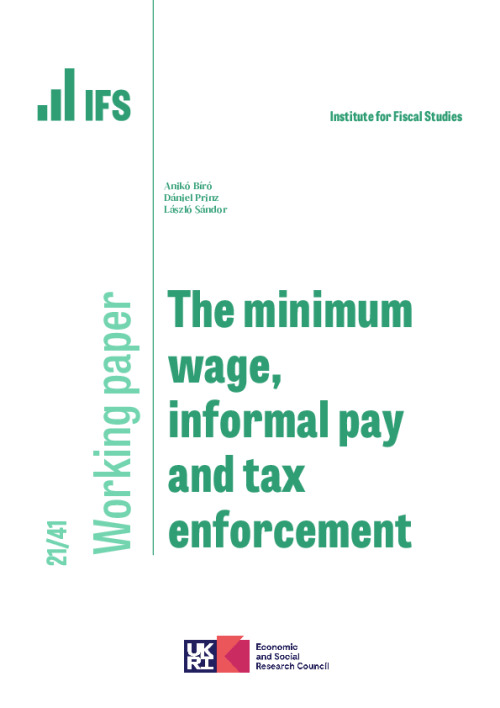Downloads
We study the taxation of the minimum wage in an environment with imperfect enforcement and informality. We leverage an increase in the audit threat for earnings below a reporting threshold at twice the minimum wage in Hungary and estimate reporting and employment responses with administrative panel data. Using bunching estimators and difference-in-differences methods, we show that a substantial share of those who report earning the minimum wage earn at least the same amount off the books. When enforcement is imperfect, a taxed minimum wage serves as a backstop on underreporting and recovers some revenue but also increases informality.
Authors

Research Associate World Bank
Daniel is an economist at the World Bank. His research covers topics in public finance, including social insurance, taxation, and inequality.

Research Associate
Anikó is a Research Associate at the IFS and a senior researcher at the Institute of Economics, Centre for Economic and Regional Studies in Budapest.

László Sándor
Working Paper details
- DOI
- 10.1920/wp.ifs.2021.4121
- Publisher
- Institute for Fiscal Studies
Suggested citation
A, Bíró and D, Prinz and L, Sándor. (2021). The minimum wage, informal pay and tax enforcement. London: Institute for Fiscal Studies. Available at: https://ifs.org.uk/publications/minimum-wage-informal-pay-and-tax-enforcement (accessed: 20 April 2024).
More from IFS
Understand this issue

Spring Budget 2024: What you need to know
7 March 2024

Big firm, little firm: are differences between companies driving inequality and holding back growth?
30 August 2023

Still a man’s world? Gender inequalities, parenthood and the workplace
23 August 2023
Policy analysis

Recent trends in public sector pay
26 March 2024

Gap between higher- and lower-paid public sector workers falls by more than a third since 2007 as doctors and experienced teachers have faced unprecedented pay cuts
26 March 2024

Oil and gas make Scotland’s underlying public finances particularly volatile and uncertain
27 March 2024
Academic research

Labour market inequality and the changing life cycle profile of male and female wages
15 April 2024

Interpreting cohort profiles of lifecycle earnings volatility
15 April 2024

There and back again: women’s marginal commuting costs
2 April 2024
